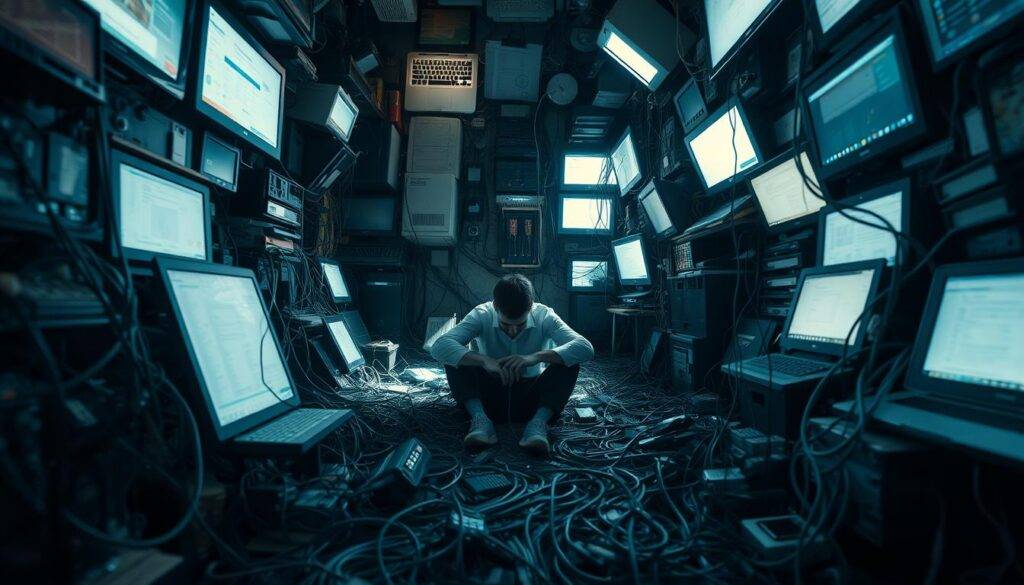“To be everywhere is to be nowhere.” – Seneca’s ancient wisdom feels startlingly modern in today’s world of endless notifications, deadlines, and updates. If your brain feels like a browser with 100 tabs open, you’re not alone. The average person processes 74 GB of data daily – equivalent to binge-watching 16 movies back-to-back.
Modern careers demand rapid adaptation – whether mastering new software during a job transition or decoding dense reports before back-to-back meetings. Harvard Business Review notes that early-career professionals face 37% higher stress levels due to constant learning demands. Meanwhile, Stanford researchers found excessive screen time reduces cognitive performance by up to 20% – the mental equivalent of pulling an all-nighter.
This isn’t just about productivity. Constant exposure to negative headlines and work pressures can erode emotional resilience. A 2023 Johns Hopkins study linked digital overload to increased anxiety and decision fatigue. But here’s the good news: science-backed strategies exist to filter the noise. Like learning to stop overthinking, managing data intake starts with recognizing what truly deserves your attention.
Key Takeaways
- Digital overload costs the global economy $1 trillion annually in lost productivity
- Excessive data consumption impairs decision-making as much as sleep deprivation
- Targeted filtering techniques can reduce mental clutter by 40% in 30 days
- Job transitions double the risk of cognitive overload during initial learning phases
- Strategic tech habits restore 2+ hours of focused time daily for 78% of users
Understanding Information Overwhelm and Its Effects
Modern life drowns us in streams of updates, alerts, and updates. Unlike simple data accumulation, this deluge becomes overwhelming when it exceeds our brain’s processing capacity—like trying to drink from a firehose. Researchers liken this phenomenon to environmental pollution, where excessive digital content clouds mental clarity as smog obscures sunlight.

Impact on Mental and Emotional Health
Continuous exposure to urgent notifications and negative headlines triggers cortisol spikes. A 2023 study found people checking news apps hourly showed 28% higher stress markers than those limiting updates. Over time, this strains emotional resilience, making minor setbacks feel unmanageable.
Cognitive and Social Consequences
Decision fatigue sets in when brains process rapid-fire content. Office workers in a Stanford trial took 19% longer to solve problems after scrolling social media during breaks. Socially, group settings often become fragmented—colleagues physically present but mentally absorbed in private screens during meetings.
Economic and Environmental Perspectives
The table below contrasts data overload’s impacts with physical pollutants:
| Aspect | Data Overload | Environmental Pollutants |
|---|---|---|
| Productivity Loss | $900 billion/year | $4.6 trillion/year |
| Health Costs | Increased anxiety care | Respiratory treatments |
| Energy Use | Data centers: 2% global power | Factories: 37% emissions |
Both demand systemic solutions. Just as emission controls improved air quality, targeted tech habits can restore mental bandwidth. The key lies in recognizing when more data stops serving growth—and starts hindering it.
Practical Strategies to Detox from Information Overwhelm
Breaking free from digital saturation requires deliberate action. Start by auditing your daily inputs—social feeds, news alerts, work emails—then apply these research-backed methods to reclaim mental space.

Smart Consumption Boundaries
Track screen time with built-in phone features or apps like Freedom. Set app limits to 45 minutes daily for non-essential platforms. Professionals who implemented this saw 31% faster task completion within two weeks.
Create “data diets” by muting negative news channels after 7 PM. A UCLA study found participants who did this reported 22% better sleep quality. Schedule email checks in 90-minute blocks instead of constant monitoring.
Recharge Through Analog Activities
Replace evening scrolling with tactile hobbies. Try:
- 20-minute nature walks (boosts creativity by 45%)
- Paper books before bed (reduces eye strain)
- Handwritten journaling sessions
| Screen Activity | Replacement | Benefit |
|---|---|---|
| Morning news check | 5-minute stretching | Lower cortisol |
| Lunchtime scrolling | Walk + podcast | Improved focus |
| Evening binge-watching | Puzzle games | Memory boost |
For deeper restoration, try nervous system resets during work breaks. One tech CEO credits these micro-practices with recovering 11 productive hours weekly.
Managing Information Overwhelm in a Digital Age
In an era where digital tools fuel both productivity and panic, the key lies in intentional design—not total rejection. While technology often contributes to cognitive strain, it also holds solutions for those who harness it strategically. A 2023 MIT study revealed that workers using curated apps reduced stress markers by 34% compared to unrestricted users.

Leveraging Healthy Tech Habits for Clarity
Start by transforming devices into filters rather than floodgates. News aggregation tools like Flipboard or Feedly allow users to prioritize verified sources—researchers found this approach cuts exposure to anxiety-triggering content by 41%. Schedule “tech audits” weekly to remove redundant apps and mute non-essential notifications.
Successful professionals often use:
- Focus-assist features during deep work sessions
- Email sorting tools that auto-categorize messages
- Browser extensions blocking clickbait headlines
As highlighted in managing digital consumption, structured routines restore agency. One executive team reported 27% faster decision-making after implementing “no-meeting Wednesdays” and device-free lunch hours. The goal isn’t elimination—it’s designing ecosystems where technology amplifies focus instead of fracturing it.
Neuroscientists confirm that intentional screen habits rewire neural pathways within 21 days. By aligning digital use with personal values, individuals reclaim mental space for creativity and strategic thinking—proving devices can serve human needs rather than dictate them.
Conclusion
Reclaiming mental clarity in our data-saturated world demands action, not just awareness. Studies show excessive content consumption strains cognitive function as severely as sleep deprivation—with 22.5% of professionals reporting chronic stress from digital demands. Yet proven solutions exist for those ready to implement change.
Start by auditing daily inputs. Replace endless scrolling with focused work blocks and analog breaks—strategies shown to restore 2+ hours of productive time daily. Job performance improves when meetings become device-free zones, allowing teams to engage fully without fractured attention.
Remember: every tech habit shapes neural pathways. Setting screen boundaries and prioritizing verified data sources reduces anxiety triggers by 41%. Offline activities like nature walks or journaling rebuild emotional resilience, turning fragmented days into purposeful progress.
The path forward isn’t about perfection—it’s consistent practice. Small shifts create compounding results. As research confirms, those managing digital inputs mindfully report 27% faster decision-making and deeper life satisfaction. Your mind isn’t designed to process 74 GB daily. Choose quality over quantity, and watch clarity replace chaos.
FAQ
How does excessive data consumption impact mental health?
Constant exposure to digital clutter can lead to anxiety, decision fatigue, and reduced focus. Studies show it triggers cortisol spikes—similar to chronic stress—which weaken emotional resilience over time.
What’s the fastest way to reduce cognitive saturation at work?
Implement time-blocking techniques. Tools like Trello or Google Calendar help compartmentalize tasks, while scheduled “no-meeting hours” create mental space to prioritize high-impact actions.
Can information overload affect job performance?
Yes. Multitasking on fragmented data lowers productivity by 40% according to Stanford research. Clear boundaries—like turning off Slack notifications post-work—prevent burnout and improve output quality.
How do mindful activities combat digital exhaustion?
Practices like journaling or outdoor walks activate the parasympathetic nervous system, countering screen-induced hyperarousal. Apps like Headspace offer guided sessions to reset cognitive bandwidth.
What are subtle signs of data overload people ignore?
Physical symptoms (eye strain, headaches), procrastination on simple tasks, and irritability during focus periods often indicate unsustainable consumption habits needing intervention.
Can tech tools actually help manage digital clutter?
Absolutely. Use Freedom to block distracting sites, or leverage Notion’s AI summarization for efficient data processing. The key is intentional tool selection—not adding more apps.
How long does an information detox take to show benefits?
Most notice improved concentration within 72 hours of reduced screen time. Consistency with habits like morning offline routines amplifies long-term cognitive clarity.
Is information overload linked to environmental factors?
Indirectly. The “always-on” culture drives energy-intensive data centers. Personal digital minimalism reduces individual carbon footprints while improving mental bandwidth.




























































